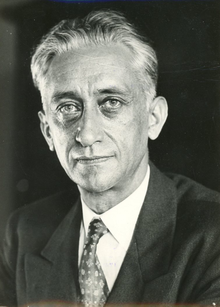
Jacques Fouques-Duparc (4 March 1897, in Paris – 2 August 1966) was a French diplomat and writer. [1] [2]
Jacques Fouques-Duparc was born in Paris on 4 March 1897, the son of a diplomat. [1] [2] He studied at the Lycée Condorcet and later at the Institut d'Études Politiques de Paris (Sciences-Po) and became licentiate in literature and doctor of law. [1] He was a soldier during World War I and received the Croix de guerre.
Fouques-Duparc began his diplomatic career in 1921 as part of the French delegation at the League of Nations, the precursor to the United Nations which had been founded in 1919. [1] [2] He worked there until 1924 and again between 1926 and 1932. From 1924 to 1926, he worked as an embassy secretary at the French embassy in Berlin. [1] [2] In 1932, Fouques-Duparc returned to France where he worked in various positions in the central administration of the Ministry of Foreign Affairs and as a senior advisor for Louis Barthou and Yvon Delbos. [1] [2] In 1938, he left France again, this time for Madrid where he worked at the embassy for a year before joining the French public radio administration as the head of the foreign language broadcasts. [1] [2] After the French defeat to Germany in 1940, Fouques-Duparc, who was hostile to the Vichy Regime, was dismissed and joined the French Resistance. [1] [2]
Following the war, Fouques-Duparc resumed his diplomatic career and was a delegate at the 1945 United Nations Conference on International Organization in San Francisco and a senior advisor to Léon Blum. [1] In 1947, he was named French ambassador to Italy and held the position until 1957. [3] He finished his career in France holding various responsibilities in French foreign affairs. [1]
- La protection des minorités de race, de langue et de religion : Étude de droit des gens, Dalloz, 1922. ( Full text)
- Le Troisième Richelieu. Libérateur du territoire en 1815, Lyon, Lardanchet, 1940
- ^ a b c d e f g h i j Minot, Paule-Cécile (1994). Versailles à travers ces grandes familles (in French). Nouvelles Editions Latines. p. 90. ISBN 9782723304900. Retrieved 6 September 2012.
- ^ a b c d e f g "Jacques Fouques-Duparc" (in German). Munzinger-Archiv. Retrieved 7 September 2012.
- ^ "Liste chronologique des Ambassadeurs depuis 1875" (in French). French Embassy in Rome. Retrieved 7 September 2012.

Jacques Fouques-Duparc (4 March 1897, in Paris – 2 August 1966) was a French diplomat and writer. [1] [2]
Jacques Fouques-Duparc was born in Paris on 4 March 1897, the son of a diplomat. [1] [2] He studied at the Lycée Condorcet and later at the Institut d'Études Politiques de Paris (Sciences-Po) and became licentiate in literature and doctor of law. [1] He was a soldier during World War I and received the Croix de guerre.
Fouques-Duparc began his diplomatic career in 1921 as part of the French delegation at the League of Nations, the precursor to the United Nations which had been founded in 1919. [1] [2] He worked there until 1924 and again between 1926 and 1932. From 1924 to 1926, he worked as an embassy secretary at the French embassy in Berlin. [1] [2] In 1932, Fouques-Duparc returned to France where he worked in various positions in the central administration of the Ministry of Foreign Affairs and as a senior advisor for Louis Barthou and Yvon Delbos. [1] [2] In 1938, he left France again, this time for Madrid where he worked at the embassy for a year before joining the French public radio administration as the head of the foreign language broadcasts. [1] [2] After the French defeat to Germany in 1940, Fouques-Duparc, who was hostile to the Vichy Regime, was dismissed and joined the French Resistance. [1] [2]
Following the war, Fouques-Duparc resumed his diplomatic career and was a delegate at the 1945 United Nations Conference on International Organization in San Francisco and a senior advisor to Léon Blum. [1] In 1947, he was named French ambassador to Italy and held the position until 1957. [3] He finished his career in France holding various responsibilities in French foreign affairs. [1]
- La protection des minorités de race, de langue et de religion : Étude de droit des gens, Dalloz, 1922. ( Full text)
- Le Troisième Richelieu. Libérateur du territoire en 1815, Lyon, Lardanchet, 1940
- ^ a b c d e f g h i j Minot, Paule-Cécile (1994). Versailles à travers ces grandes familles (in French). Nouvelles Editions Latines. p. 90. ISBN 9782723304900. Retrieved 6 September 2012.
- ^ a b c d e f g "Jacques Fouques-Duparc" (in German). Munzinger-Archiv. Retrieved 7 September 2012.
- ^ "Liste chronologique des Ambassadeurs depuis 1875" (in French). French Embassy in Rome. Retrieved 7 September 2012.